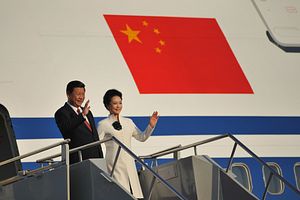China is fast becoming a global actor, as its economic and diplomatic presence is felt nearly everywhere around the world.
It is also viewed by many as a global power in the making. In economic and military terms, China surely has the trappings of a global power. It is the world’s the second largest economy and the top trading nation; it also boasts the world’s largest foreign exchange reserve. Meanwhile, China’s military budget is second only to that of the United States, and its arsenal of advanced weapons is quickly expanding.
Nevertheless, there is much more to a global power than simply economic and military might. It is one thing to have power resources, and it is another to translate these resources into preferred outcomes. The latter requires — among other things — strategic vision, political willingness and psychological readiness. Leaders in Beijing appear to have a sophisticated vision for China’s role in international affairs, as exemplified by “a new model of major-power relations,” “major country foreign policy with Chinese characteristics,” and “One Belt, One Road.” But it is highly questionable that they are also politically wiling and psychologically ready to turn that vision into reality.
A global China has global interests, such as its investment in oil fields in the Sudan, pipelines in Myanmar, ports in Pakistan, and mines in Afghanistan. Meanwhile, as China goes global, so does the Chinese diaspora — businessmen, students, and workers. Protecting these interests — and many others — is one of the key challenges for Beijing. The evacuation of more than 30,000 Chinese nationals and the loss of multi-billion dollar oil investments during the Libya crisis amply demonstrate the urgency of such challenges.
However, China’s willingness to protect overseas interests has its limits. Due to the Five Principles of Peaceful Coexistence, Beijing has been extremely reluctant to intervene — politically or militarily — in another country’s domestic affairs. Thus during the anti-Chinese riots in Jakarta in 1998, the Chinese government did nothing except for issuing a verbal protest. Such a stance undoubtedly adds to the credibility of Beijing’s commitment to non-interference, but it nevertheless badly hurts its image as the patriarch of Chinese expatriates.
The Jakarta riots occurred in the early days of China’s rapid rise. If similar incidents take place today, rising domestic expectations — flamed by Chinese and foreign media hype about a rejuvenated Middle Kingdom — and the power of the internet will almost certainly make it impossible for Beijing to adopt a hands-off approach. Moreover, if Beijing expects overseas Chinese to have cultural identities and political sympathies with the mainland, then the latter will expect the former to offer more than lip service in times of crises. For China to be a global power, therefore, one of the most difficult questions is what it should do when interests conflict with principles.
A global power has not only global interests, but also global responsibilities, such as climate change, nuclear nonproliferation, anti-terrorism, anti-piracy, to name just a few. Having overseas military bases should probably help China better fulfill some of these responsibilities. However, leaders in Beijing have shown no intention at all of stationing troops overseas, despite increasing calls by Chinese pundits to the contrary. China’s leaders continue to deny all rumors that they are seeking to establish bases overseas.
From Beijing’s perspective, setting up overseas military bases is tantamount to building a military alliance with the host country (even though military basing arrangements in practice do not require a formal alliance). China’s leaders have repeatedly denounced such alliances as remnants of the Cold War. Instead Beijing has touted its “network of partnerships” as the substitute for security alliances. In fact, even between China and Pakistan — a relationship characterized by top Chinese leaders as an “all-weather strategic partnership — there is no formal security treaty. China’s reluctance to formalize security relationships has so far prevented it from taking the logical next step in becoming a true global power: pursuing overseas bases.
Even if we assume that at some point in the future China will have overseas military bases and that the government is willing to deploy troops to places where its own vital interests — or the interests of the international community — are threatened, two more questions arise: Are the Chinese people willing to send their sons and daughters to fight on foreign soil? Are they ready to confront images of their beloved ones coming home in draped caskets?
Last but not certainly not least, overseas intervention will likely incur the wrath of foreigners who are deeply upset by China’s policies, and they may well take revenge by attacking Chinese nationals abroad or even conducting terrorist attacks in Chinese cities. Are the Chinese government and the Chinese people ready to face such consequences?
It takes more than economic resources and military capabilities to make a global power, as amply illustrated by the case of the United States. Neither Chinese leaders nor Chinese citizens, however, seem psychologically ready — at least in the foreseeable future — for the challenges, responsibilities, and consequences that result from China being a global power.

































